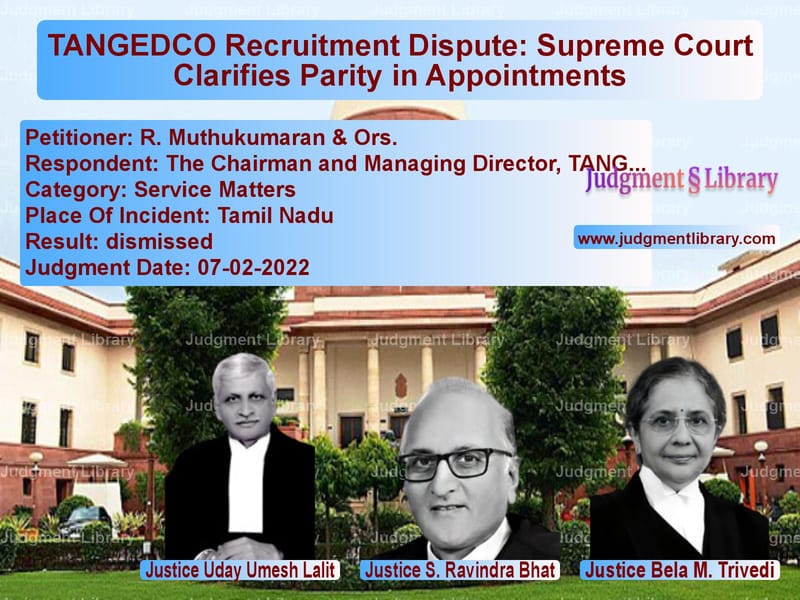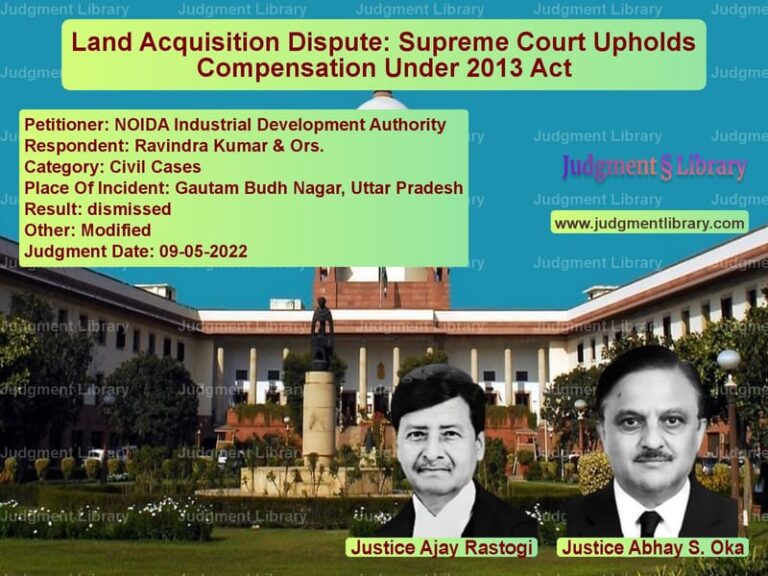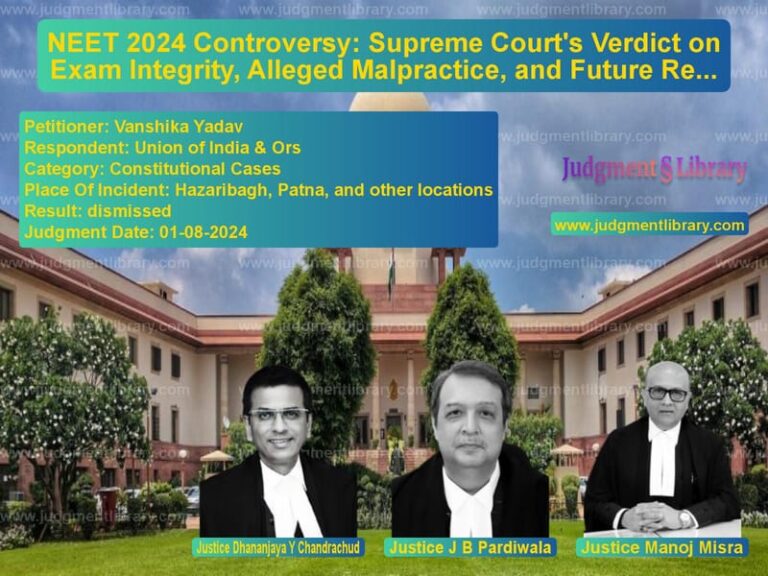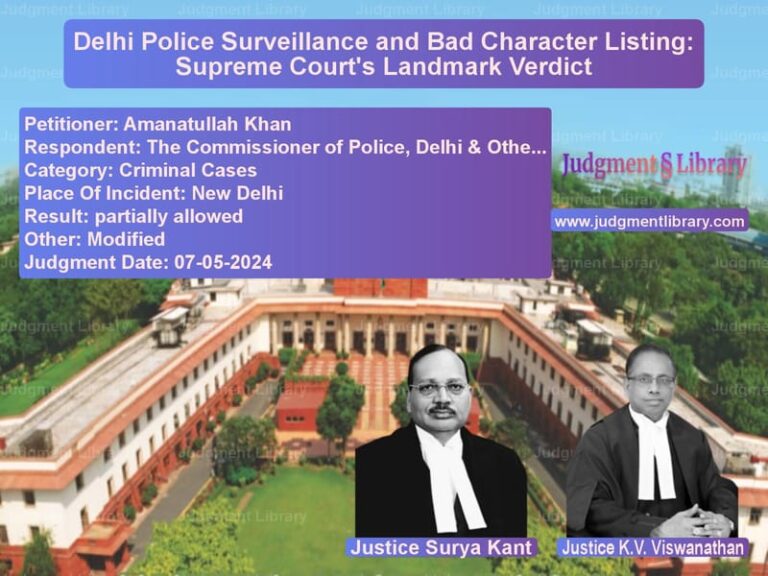TANGEDCO Recruitment Dispute: Supreme Court Clarifies Parity in Appointments
The Supreme Court’s ruling in R. Muthukumaran & Ors. vs. The Chairman and Managing Director, TANGEDCO & Ors. provides crucial guidance on employment disputes, especially regarding the doctrine of parity in public sector recruitments. The case revolves around the selection process for ITI Helper (Trainee) posts at Tamil Nadu Generation and Distribution Corporation Ltd. (TANGEDCO). The judgment clarifies whether a group of unsuccessful candidates can claim employment benefits granted through a judicial compromise to another set of unsuccessful candidates.
Background of the Case
The dispute arose from the 2012 recruitment process initiated by TANGEDCO for 4000 ITI Helper (Trainee) positions. These posts were to be filled via direct recruitment through the Employment Exchange. The selection criteria included:
- 85% weightage for ITI academic performance
- 15% weightage for a viva-voce test, including proficiency in cycling and pole climbing
Several unsuccessful candidates challenged the recruitment process, alleging that TANGEDCO unfairly introduced a viva-voce component despite initially resolving not to conduct one. The Madras High Court dismissed their petitions in 2014. However, in 2015, TANGEDCO entered into a judicial compromise with 84 unsuccessful candidates, agreeing to appoint them as ITI Helpers.
Subsequently, more unsuccessful candidates sought similar relief, arguing that they were entitled to the same treatment under the principle of parity. Their claims were rejected by the High Court, leading to appeals before the Supreme Court.
Arguments by the Parties
Petitioner’s Arguments (Unsuccessful Candidates Seeking Parity)
- The judicial compromise in 2015 benefited a select group of unsuccessful candidates. Denying the same benefit to others violated Article 14 of the Constitution (Right to Equality).
- Many of the appellants performed better than those who were appointed through the compromise. Denying them employment was arbitrary.
- The recruitment process was flawed, as TANGEDCO changed the rules mid-way by introducing a viva-voce component.
- The principle of non-discriminatory treatment required that all similarly situated candidates be given equal treatment.
Respondent’s Arguments (TANGEDCO)
- The 2015 judicial compromise was a one-time concession and did not establish a legal precedent.
- The candidates who were appointed through the compromise had filed petitions earlier, whereas the appellants approached the court much later.
- A mistake or deviation in one instance does not create a right for others to claim similar treatment (Doctrine of Negative Equality).
- The judicial compromise was not based on merit but was a concession granted to settle litigation.
Supreme Court’s Key Observations
1. No Legal Right Arises from a Judicial Compromise
The Supreme Court ruled that a judicial compromise is a negotiated settlement and does not constitute a binding precedent.
“The court did not examine – at least its order does not disclose any such consideration – the merits of the case, and why such proposal was justified in the facts of the case.”
Since the compromise did not rest on legal merit, it could not be used to claim parity.
2. Principle of Parity Does Not Apply to Unlawful Concessions
The Court reaffirmed that Article 14 does not mandate the extension of an unlawful or discretionary benefit to others. It cited Basawaraj & Anr. vs. Special Land Acquisition Officer, which states:
“If some similarly situated persons have been granted some relief inadvertently or by mistake, such an order does not confer any legal right on others to get the same relief.”
3. Delay in Approaching the Court Weakens the Claim
The Court found that the appellants had waited for the judicial compromise before filing their own claims. Such delayed claims cannot be entertained, as per the ruling in State of Uttar Pradesh vs. Aravind Kumar Srivastava:
“Those who did not challenge the wrongful action in their cases and acquiesced into the same and woke up after a long delay only because their counterparts who had approached the Court earlier succeeded, cannot claim similar benefits.”
4. TANGEDCO’s Conduct in the Judicial Compromise Was Inappropriate
The Court criticized TANGEDCO for granting employment to 84 candidates without any legal basis:
“The harm and deleterious effect of such conduct is to prioritize the claim of those before the court, when it is apparent that a large body of others, waiting with a similar grievance, are not parties to the proceedings.”
The Court noted that public employers must exercise discretion responsibly and not engage in arbitrary settlements.
Final Judgment
The Supreme Court ruled as follows:
- The appeals of the unsuccessful candidates seeking parity were dismissed.
- The High Court’s judgment upholding TANGEDCO’s rejection of further claims was affirmed.
- TANGEDCO’s appeal against the High Court’s directive to extend employment to additional candidates was allowed.
Impact of the Judgment
This ruling reinforces several crucial principles:
- A judicial compromise does not establish a precedent for others to claim benefits.
- The principle of equality under Article 14 does not apply to mistakes or discretionary concessions.
- Employment disputes must be resolved based on established rules, not on settlements reached in litigation.
- Public sector employers must act responsibly in hiring decisions to prevent arbitrary and discriminatory appointments.
This judgment serves as a cautionary ruling against the misuse of judicial settlements and reinforces the importance of lawful hiring practices in public employment.
Petitioner Name: R. Muthukumaran & Ors..Respondent Name: The Chairman and Managing Director, TANGEDCO & Ors..Judgment By: Justice Uday Umesh Lalit, Justice S. Ravindra Bhat, Justice Bela M. Trivedi.Place Of Incident: Tamil Nadu.Judgment Date: 07-02-2022.
Don’t miss out on the full details! Download the complete judgment in PDF format below and gain valuable insights instantly!
Download Judgment: r.-muthukumaran-&-or-vs-the-chairman-and-man-supreme-court-of-india-judgment-dated-07-02-2022.pdf
Directly Download Judgment: Directly download this Judgment
See all petitions in Employment Disputes
See all petitions in Recruitment Policies
See all petitions in Public Sector Employees
See all petitions in Judgment by Uday Umesh Lalit
See all petitions in Judgment by S Ravindra Bhat
See all petitions in Judgment by Bela M. Trivedi
See all petitions in dismissed
See all petitions in supreme court of India judgments February 2022
See all petitions in 2022 judgments
See all posts in Service Matters Category
See all allowed petitions in Service Matters Category
See all Dismissed petitions in Service Matters Category
See all partially allowed petitions in Service Matters Category







